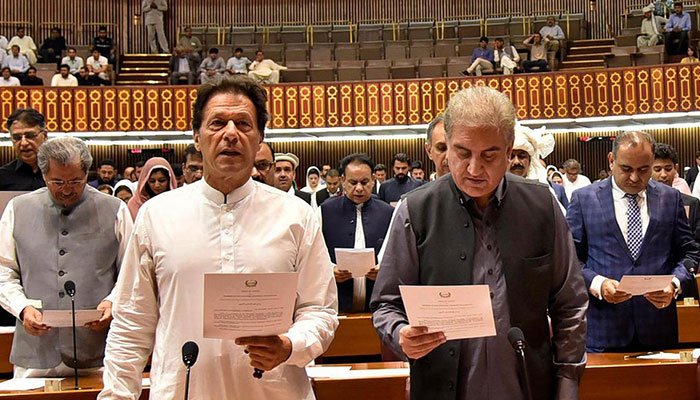A flurry of ordinances: Why is the PTI pushing them through the parliament?
"In PTI's first year, the parliament passed seven bills, while seven ordinances were promulgated," writes Aasiya Riaz of the PILDAT
September 09, 2019

Article 89 of the constitution defines in detail the process of legislation through ordinances. It stipulates that only in exceptional circumstances can the federal government exercise such an authority.
The clause further lays out those special cases. The president, it adds, may promulgate an ordinance when the Senate or the National Assembly is not in session, and only if the president is "satisfied that circumstances exist which render it necessary to take immediate action."
Now, while an ordinance is deemed to have the same force and effect as an act of Parliament, it stands expired at the end of 120 days of its promulgation.
In April 2010, the 18th amendment to the constitution barred the government from re-promulgation of the same ordinance. Earlier, no such bar existed. The ruling party had the power to push through an ordinance, after its expiry, and for as many times as it deemed fit.
An ordinance, once promulgated for 120 days, can only be extended once more by the parliament, through a resolution, that can originate and be passed in either national assembly or the Senate. This means an ordinance, if extended by a house, can only be valid for 240 days (2 terms only). Also, after the promulgation of an ordinance, the passage of a resolution in either house can reject the ordinance, which means it stands void the day the resolution is passed so it can’t even be on the books for 120 days.
The intent of the constitution, therefore, is very clear. Legislation through ordinances can only be used as a stopgap arrangement, when either house of parliament is not in session. Article 89 does not allow the government to bypass the National Assembly and the Senate, who have the constitutionally defined mandate to legislate "with respect to any matter in the federal legislative list", as per article 70 (1) of the constitution.
Prior to the 18th Amendment, and especially during the term of the 12th National Assembly (2002-2007) under the Musharraf era, ordinances promulgated by presidential decree outnumbered legislation by the Parliament.
In the five years of the 12th National Assembly, 50 pieces of legislation were passed by the Parliament. In comparison, 121 presidential ordinances were promulgated in this period, overshadowing the role of the elected legislature. From 2002-2007, the ordinance to bill ratio stood at 2.4 to 1. Therefore, for every two and a half ordinances promulgated by the president, the National Assembly passed only one bill. When the Pakistan Institute of Legislative Development and Transparency (PILDAT), an independent think tank, compared this with the Indian Lok Sabha, during the same period, where the Indian constitution also allows for legislation through ordinances in exceptional circumstances, the Lok Sabha passed a total of 248 laws as compared to only 34 ordinances. The ratio was seven laws passed by Lok Sabha to one ordinance.
It must be noted that prior to the 18th Amendment, Article 89 only allowed the president to promulgate an ordinance when the National Assembly was not in session. But this requirement was frequently bypassed as ordinances were issued in many instances merely a few hours before the National Assembly was scheduled to meet.
Over the years though, the legislation to ordinance ratio in Pakistan has improved.
A comparative performance analysis of successive assemblies shows that more and more legislation has originated and has been passed within legislatures and not through promulgation of ordinances. However, some cases were recorded during the assembly tenures from 2008-2013 and 2013-2018, where the parliament was bypassed to bulldoze laws through ordinances.
In the first parliamentary year after the July 2018 general election, the Parliament has passed seven bills, while seven ordinances have been promulgated by the government between August 2018 and August 2019.
In December, the newly-elected prime minister told a press gaggle that since his political party, and its allies, lacked majority in the upper house to pass legislation smoothly, they would not be in favour of reaching any settlements with the opposition parties and would make legislation through ordinances. It seems the government is now following that route, instead of engaging with the opposition.
Riaz is the joint director of PILDAT











